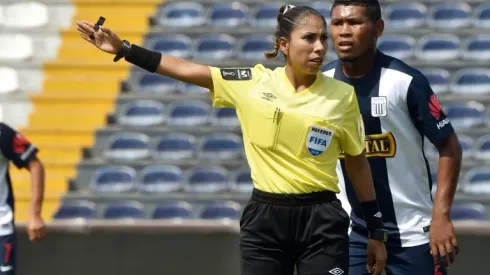Lima (AFP) – A rough tackle, the whistle blows and a foul is given. “Get back in the kitchen!” the player yells at the referee.
It’s one of the kinder things male players have said to Melany Bermejo, one of the rare women referees in the macho world of Latin American football.
Shoved, spat at, insulted and flirted with on the field, she and a handful of other women are nevertheless close to the top of their profession in men’s football games.
“You have to make double the effort a man makes,” says Lixy Enriquez, 42, an assistant referee in Mexico.
Bermejo, a 37-year-old PE teacher, has served as referee at second-division masculine games in her native Peru.
Like most of her female counterparts around the world, she has yet to break into the top league, where so far women serve only as lineswomen or fourth officials.
There are exceptions.
In Uruguay, Claudia Umpierrez, 33, made her top-flight debut in February as a referee in men’s games.
In Venezuela, Emikar Caldera and Yersinia Correa have been refereeing such games for three years.
Outside Latin America, Gladys Lengwe of Zambia is among the very few women to have reached the top level as a referee. In Ukraine, Kateryna Monzul is expected to do the same.
– ‘Go wash the dishes’ –
World football body FIFA has 720 women registered as referees for professional football games — 324 main referees and 396 assistants.
But of 209 national federations, 60 have no female referees registered, according to FIFA’s data.
“For the time being, the women work mainly in women’s and youth football or in games with reserve teams, or men’s games of indoor football,” said Carlos Coradina, director of a referees’ training college in Argentina.
The president of the Peruvian Referees’ Commission, Julio Arevalo, denied the system was sexist.
Anyone who passes the tests set for male referees by FIFA and South American football governing body CONMEBOL can do the job, he said.
Those who want to referee men’s matches must be fit enough to keep up with top male athletes charging up and down the field.
“Male football is very fast and the players are very skilled,” says Loreto Toloza, 32, a female assistant referee in Chile.
But when a woman does make the grade, an different challenge begins.
The worst insults from the stands come from women fans, Lixy Enriquez says. The male fans yell: “I want to take home the assistant.”
The reception on the field is not always better.
When Virginia Tovar became the first woman to referee a top-league men’s match in Mexico in 2004, the star player Cuauhtemoc Blanco reportedly yelled at her: “Go and wash the dishes.”
In Argentina, referee Salome di Iorio says players have asked her to take down their phone numbers when she gets out her notebook. Others just spit at her.
– Strict women referees –
The pressure of verbal abuse turns the job into a psychological as well as a physical challenge.
“Some players do not want female referees and are not adapting to the idea,” Peruvian referee Johanna Vega says.
“I am very serious when I come onto the field,” she adds. “You have to be a psychologist” to put up with the insults.
Bernardo Corujo, president of the Venezuelan Referees’ Commission, reckons female referees are “stricter” than their male counterparts.
But they have fought a strict, sometimes overtly discriminatory, system.
In Argentina, Florencia Romano went on hunger strike in 1996 to demand the right to be registered as a professional referee.
The head of the Argentine Football Association at the time, Julio Grondona, said it was not “sensible” for a woman to do the job. Romano ended up being accepted anyway.
For women who make the grade, the psychological pressure can even turn to violence.
“One player jumped on me when I gave a foul and he didn’t like it,” says Tatiana Guzman, a 28-year-old referee in Nicaragua.
“There is always the fear that someone foolish will do that. You have to be ready to run.”














